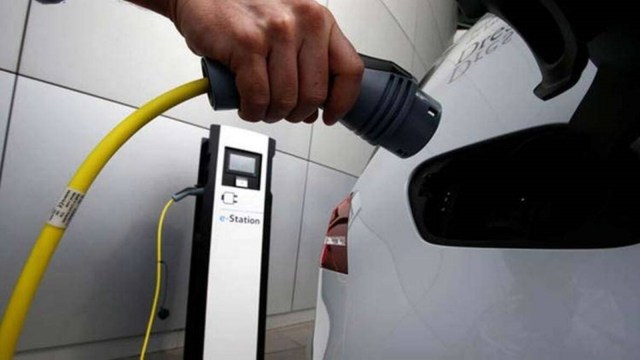Click here to join Express Pune WhatsApp channel and get a curated list of our stories
‘Just transition policy for Maharashtra in the works with focus on automotive sector’
Just transition refers to a system of moving towards a sustainable economy or society in a way that is fair and leaves nobody behind.
 Ghorpade was speaking at an event, “Exploring a Just and Inclusive EV Transition for Maharashtra MSMEs”, organised by WRI India, an independent charity that focuses on building sustainable and liveable cities and working towards a low-carbon economy, in collaboration with the Maharashtra State Climate Action Cell on Wednesday.
Ghorpade was speaking at an event, “Exploring a Just and Inclusive EV Transition for Maharashtra MSMEs”, organised by WRI India, an independent charity that focuses on building sustainable and liveable cities and working towards a low-carbon economy, in collaboration with the Maharashtra State Climate Action Cell on Wednesday.
Maharashtra will have a just transition policy soon, of which automotive will be an important sector, announced Abhijit Ghorpade, director of State Climate Action Cell, Government of Maharashtra.
Ghorpade was speaking at an event, “Exploring a Just and Inclusive EV Transition for Maharashtra MSMEs”, organised by WRI India, an independent charity that focuses on building sustainable and liveable cities and working towards a low-carbon economy, in collaboration with the Maharashtra State Climate Action Cell on Wednesday.
Just transition refers to a system of moving towards a sustainable economy or society in a way that is fair and leaves nobody behind. It is a response to the intensifying impacts of global warming that are being seen across the world, in the form of droughts, floods, storms, landslides, cloudbursts and extreme weather conditions, including erratic monsoon cycles.
India is a signatory to the Paris Agreement, which sets out the goal of limiting the average global temperature rise to 2 degrees Celsius – ideally 1.5 degrees C– from pre-industrial times. India is aiming to reduce the emission intensity of GDP by 45 per cent by 2030 and reach net-zero by 2070.
“We aim to reduce our dependence on fossil fuels in generation of electricity by 50 per cent by 2030,” said Ghorpade. At the same time, the country is aiming to be a $5 trillion economy, with Maharashtra being the engine of economic growth.
“Maharashtra is the largest sub-national economy of the country and aspiring to be India’s first trillion dollar economy by 2027-28…Of all the thrust sectors, the automotive sectors is the backbone of the economy. This is the sector that contributes the highest to the state GDP at 7 per cent and the highest, again, to the state’s industrial output at 15 per cent. There are more than 16,600 industrial units operating in this sector.. together, the sector employs 3.40 lakh workers, most of whom are contractual labourers,” he said.
Maharashtra is aiming to increase the share of electric vehicles (EVs) in the total number of automobiles in the state to 10 per cent and has already crossed eight per cent. “We are promoting EV transition in the public transport very strategically,” added Ghorpade.
While the state is setting up charging infrastructure in various sites, from housing complexes to expressways, and making swift progress in EV adoption, “there is this real danger of disruption in the job market.”
“Lakhs of workers, particularly contractual and informal workers, may become unemployed because they have skills that may not match with those required for the EV era. Between 45 and 84 per cent of the auto components and spare parts might get obsolete because of the EV transitions. That would adversely affect supply chains and cause rampant unemployment,” said Ghorpade.
During the event, WRI illustrated through a presentation how different sectors of the automobile component supply chain will be impacted, from those manufacturing engine and engine parts or drive transmission and steering parts being the worst affected while those making chassis and braking parts being at a lower risk.
“There are real chances of job losses and social and economic disruptions for the community. But this can be minimized by creating an appropriate skilling infrastructure for workers to retain jobs during the transitions and creating future workforce,” said Ghorpade.
A just transition policy is yet another step in easing the process. “A just transition policy will require a review and revamping of existing policies, such as the Industrial policy, MSME policy, renewable policy and labour policy. These policies will be geared to support just transition,” said Ghorpade adding that “special support” will be given to MSMEs, which includes access to finance, technology and capacity building, trade promotions and skill development.
Six districts in Maharashtra host 65 per cent of automobile units. “Eighty-three per cent of the workforce is concentrated in these six districts, so we are trying to prepare a just transition plan adopting the cluster approach,” said Ghorpade.
In a presentation, WRI illustrated the efficacy of “cluster interactions” by engaging with industry associations, MSMEs, skilling agencies, academic institutions, startups and large manufacturers in key auto clusters of Maharashtra. Ghorpade added that 14 districts had been identified as key for the just transition policy, including the auto hubs of the state.
Click here to join Express Pune WhatsApp channel and get a curated list of our stories













